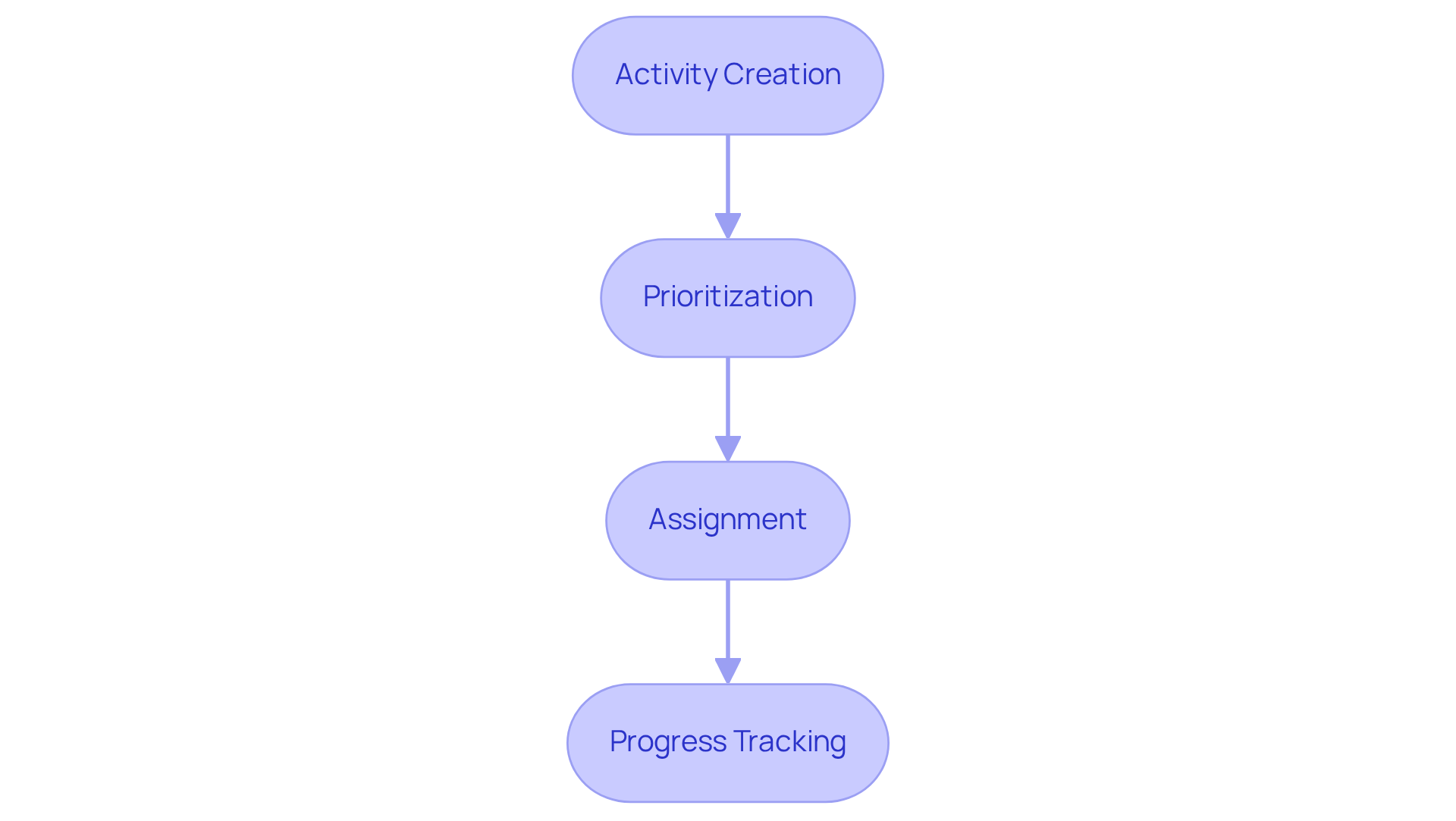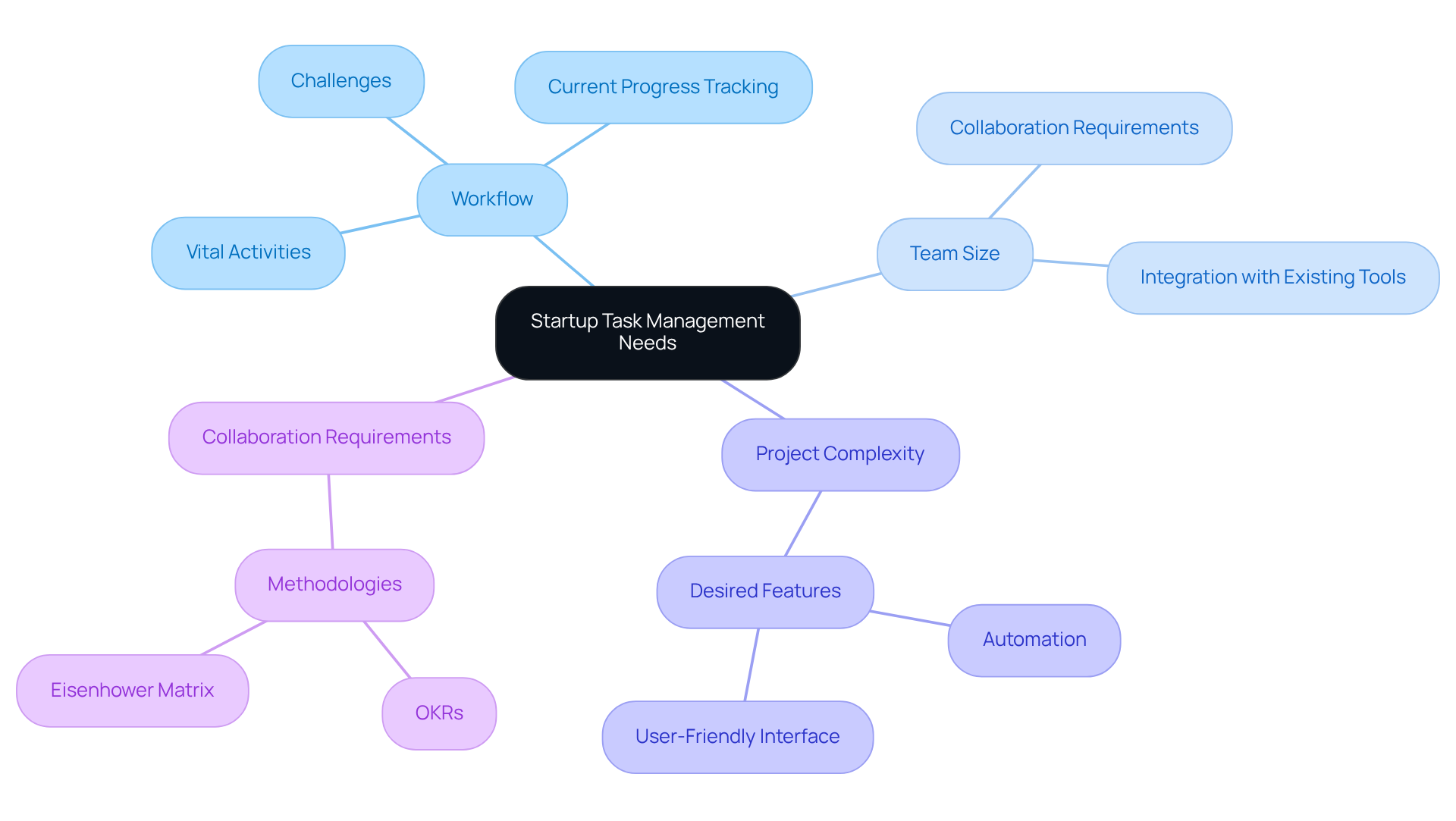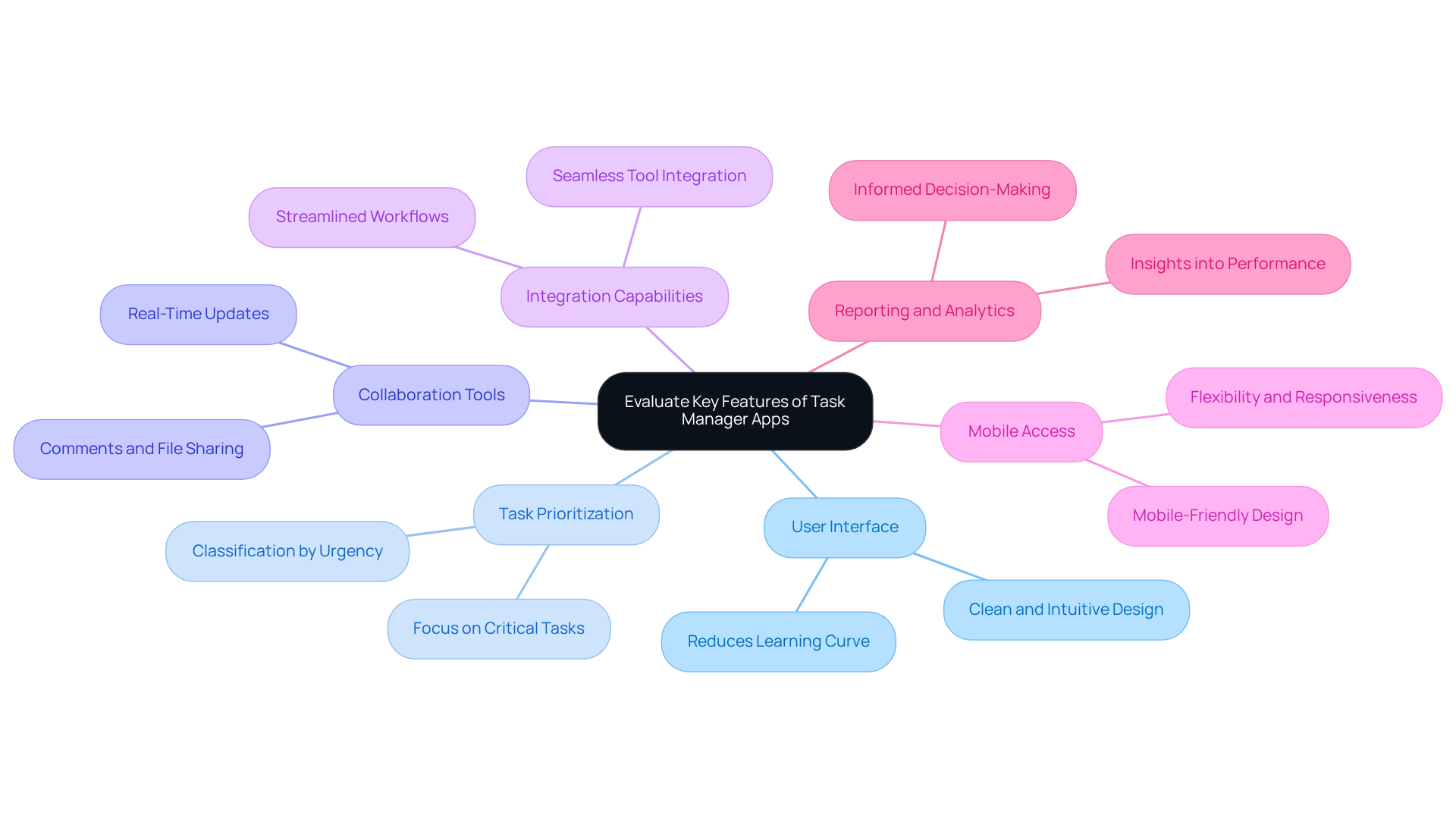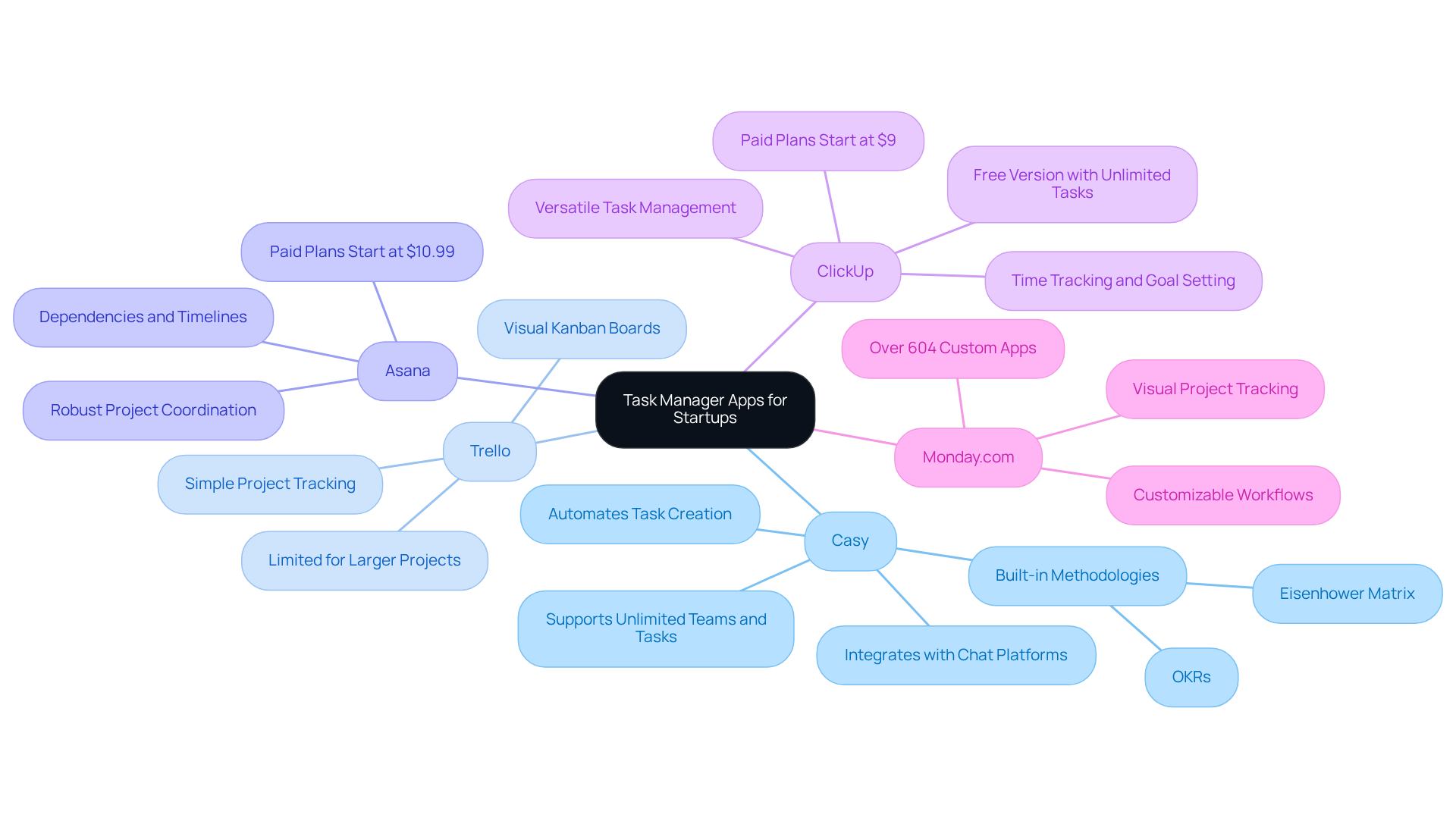Overview
The primary objective of this article is to deliver a structured methodology for startups in selecting the most suitable task manager app. By identifying unique needs and evaluating key features, it provides a clear path forward.
Essential considerations such as:
- Team size
- Project complexity
- Specific functionalities—like user interface and collaboration tools
are outlined. These elements are critical for enhancing productivity and ensuring effective project management in the dynamic environment of startups.
Are you ready to elevate your team's efficiency? Understanding these factors will empower you to make informed decisions that drive success.
Introduction
Effective task management stands as a cornerstone of success for startups navigating the chaotic waters of early-stage growth. With a staggering 70% of tech ventures failing within their first 20 months, the ability to efficiently coordinate activities can mean the difference between thriving and merely surviving. This article delves into the essential steps for selecting the right task manager app, tailored specifically for startups, highlighting the unique needs and challenges they face.
What criteria should be prioritized to ensure that the chosen tool not only enhances productivity but also aligns seamlessly with the startup's evolving objectives?
Understand Task Management Basics
Activity coordination represents a structured approach to planning, organizing, and executing activities aimed at achieving specific goals. This process consists of several crucial stages:
- Activity creation
- Prioritization
- Assignment
- Progress tracking
Startups, often operating with limited resources in fast-paced environments, face unique challenges that necessitate efficient management of responsibilities. Consider this: 70% of technology ventures fail within their first 20 months due to an inability to develop scalable software. This statistic underscores the critical importance of organized project coordination to avert issues like scope creep and missed deadlines.
Familiarizing yourself with key terms such as 'assignment', 'subtask', 'deadline', and 'priority' is vital for establishing a solid foundation in assignment management. Understanding these concepts will enable you to identify the essential elements in a task manager app that align with your business objectives. Implementing methodologies like Kanban can provide visual clarity on work statuses, empowering teams to adapt to changing requirements effectively. By concentrating on efficient project oversight and embracing best practices, new ventures can significantly enhance productivity and improve their chances of success in a competitive landscape.

Identify Your Startup's Unique Task Management Needs
To efficiently select a management application, begin by examining your startup's workflow and recognizing the particular kinds of work your team manages. Consider critical factors such as team size, project complexity, and collaboration requirements. Reflect on essential questions:
- Which activities are vital for our success?
- How do we currently track progress?
- What challenges do we face in managing activities?
By gaining a clear understanding of your unique needs, you can prioritize features in a task manager app that will significantly enhance your team's efficiency.
Look for capabilities such as:
- Automation to reduce manual input
- Seamless integration with existing tools to streamline processes
- User-friendly interfaces that facilitate quick onboarding and adoption
Furthermore, consider methodologies like OKRs and the Eisenhower Matrix to assist in effectively prioritizing activities. This customized approach guarantees that the chosen management solution aligns with your startup's operational dynamics, ultimately enhancing productivity and minimizing administrative overhead.

Evaluate Key Features of Task Manager Apps
When evaluating a task manager app, it is essential to consider several key features that can significantly impact your team's productivity.
-
User Interface: A clean, intuitive interface is crucial. It enhances usability and reduces the learning curve for team members, allowing them to adapt quickly.
-
Task Prioritization: Look for tools that enable classification of activities by urgency and significance. This functionality assists teams in concentrating on what is most important, ensuring that critical tasks receive the attention they deserve.
-
Collaboration Tools: Features such as comments, file sharing, and real-time updates are vital for facilitating teamwork and communication. They create a collaborative environment that fosters engagement and efficiency.
-
Integration Capabilities: Ensure the app can seamlessly integrate with other tools you already use, such as Slack or Google Drive. This capability streamlines workflows and enhances overall productivity.
-
Mobile Access: A task manager app that is mobile-friendly is essential for modern teams. It allows members to oversee activities while on the move, enhancing flexibility and responsiveness in a fast-paced work environment.
-
Reporting and Analytics: Tools that offer insights into completion rates and team performance are invaluable. They assist in pinpointing areas for enhancement, enabling informed decision-making and strategic planning.

Compare Popular Task Manager Apps for Startups
To assist in your decision-making process, consider this comparison of popular task management apps tailored for startups:
- Casy: An innovative tool that automates task creation from chat conversations, making it ideal for teams aiming to minimize manual input and enhance productivity.
- Trello: Known for its visual Kanban boards, Trello excels in straightforward project tracking; however, it may become unwieldy for larger endeavors.
- Asana: Offers robust project coordination features, including dependencies and timelines, making it suitable for complex projects.
- ClickUp: A versatile task manager app that combines task management with time tracking and goal setting, making it perfect for new businesses that require comprehensive solutions.
- Monday.com: Delivers customizable workflows and visual project tracking, empowering teams to adapt the tool to their specific needs.
When comparing these tools, what factors are most crucial for your startup? Consider pricing, scalability, and user reviews to determine which app aligns best with your startup's goals.

Conclusion
Choosing the right task manager app is pivotal for startups aiming to streamline operations and enhance productivity. Understanding the fundamentals of task management, identifying unique needs, evaluating key features, and comparing popular applications are essential steps. This tailored approach not only supports effective project coordination but also significantly increases the chances of success in a competitive landscape.
Throughout this discussion, we explored essential insights, including the importance of recognizing the unique requirements of a startup, such as team size and project complexity. Key features like user-friendly interfaces, task prioritization capabilities, and integration options emerged as critical determinants in the selection process. By comparing various task manager apps, startups can make informed choices that cater to their operational dynamics and strategic goals.
Ultimately, the significance of effective task management cannot be overstated. It serves as the backbone of organizational efficiency and productivity, especially for startups navigating the complexities of growth and development. By prioritizing the right tools and practices, startups can transform their task management processes, positioning themselves for sustainable success and innovation. Embrace these strategies today, and empower your startup to thrive in an ever-evolving business environment.
Frequently Asked Questions
What is activity coordination in task management?
Activity coordination is a structured approach to planning, organizing, and executing activities aimed at achieving specific goals. It involves several crucial stages, including activity creation, prioritization, assignment, and progress tracking.
Why is efficient task management important for startups?
Startups often operate with limited resources in fast-paced environments, facing unique challenges that require efficient management of responsibilities. Inefficient management can lead to issues like scope creep and missed deadlines, contributing to high failure rates, such as the 70% of technology ventures that fail within their first 20 months.
What are some key terms to understand in assignment management?
Key terms include 'assignment', 'subtask', 'deadline', and 'priority'. Familiarizing yourself with these concepts is vital for establishing a solid foundation in assignment management.
How can methodologies like Kanban help in task management?
Implementing methodologies like Kanban provides visual clarity on work statuses, allowing teams to adapt to changing requirements effectively and improving project oversight.
What can new ventures do to enhance productivity?
By concentrating on efficient project oversight and embracing best practices in task management, new ventures can significantly enhance productivity and improve their chances of success in a competitive landscape.




